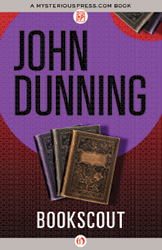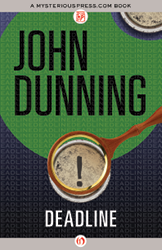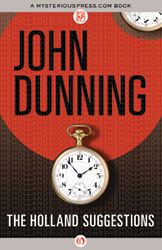Holland Suggestions (26 page)
Read Holland Suggestions Online
Authors: John Dunning
“When Kenneth first called Robert, Robert didn’t have bus-fare. Kenneth sent Robert some gold from the mine; Robert made more than two hundred dollars selling it. Lee thinks that was when the idea first began to grow: Robert saw what he could do with the money; he could set up his clinic and never have to depend on anyone for support. So he came to Colorado, and he and Kenneth explored the cave together. Kenneth never came out. Robert told Lee his line snapped when he started down the shaft.”
“No,” I said. “Gould cut it.”
“Perhaps.”
“I know it. Kenneth wouldn’t climb with a defective rope. It would have been a simple thing for Gould—just reach out from one of those side tunnels and cut it. Simple. It must have scared hell out of Robert.”
“Lee has a tape he made with Robert, and some of it is explained in there. Robert tells how the line went limp and there was a long scream. The line broke and Kenneth fell. Robert never knew how or why. He got out of there fast. Went back through the caves to the jeep. He had the idea of getting help for Kenneth. Then he started to understand that there wouldn’t be any help. Kenneth was finished. Back in Pueblo, Robert became ill. He was hospitalized and a fatal liver disorder was discovered. He died within the month.”
“And he never went back to the cave?”
“He probably intended to. The doctors told him he might live several months with proper care, but I guess Robert wasn’t the kind of man to live out his life in a bed. Yes, even then he probably intended to go back and set the wheels of his dream in motion. Only when he realized how sick he was did the plan begin to change. He came east, paid a visit to you, I believe, and then went to see Lee.”
“Yes.”
“By then the alternate plan was fully developed: one grand experiment, a demonstration of why he had lived. He put you into a deep trance?”
“Yes.”
“And later told you the experiment had failed?”
“That’s right.”
“And you never saw him again.”
“Right.”
“Well, the experiment did not fail. If anything, it was too successful. Would you like to know what happened that night?”
I laughed uneasily. “Will it hurt?”
“I hope not. Will you try it?”
“I have to try it.”
She got a small tape recorder from her room and we went into Gould’s den. She told me to lie on the sofa, facing away from the fire. When I was fixed comfortably, she came around to face me and turned down the light.
“I’m going to hypnotize you, and we’re going back to that night, April 5, 1956. We’re going to relive that night just as it happened. For a few minutes it
will
happen, exactly as before.” She took from her pocket a man’s watch, a fine gold piece on a chain fob. It didn’t take long; I gave myself up to it completely, and soon the room darkened and everything faded but that golden globe swinging before my eyes. I could hear Jill’s voice; that never went away. I knew all through the trance that she was asking questions and I was answering them, but there came a time when that other world was more important and her voice was a dull echo. I knew I could open my eyes and be awake; I could bring myself out of it any time. I just didn’t want to.
I went deeper. …
And Robert entered the room.
We stood looking at each other for a long moment. We were both embarrassed. He said can I come in, I said sure why not. But I was sorry about his job and he was sorry about Vivian.
He asked about her. His eyes were dull.
He told me he was dying.
He had come to ask a favor; one final Jake Walters experiment, the last thing he would ever ask of anyone. How could I refuse? He dimmed the lights, as dim as they are now, and we began. He took me deeper than ever before, but there was no attempt to call up Jake Walters. He took a manila folder from his briefcase and brought out two mountain pictures.
“You will see these pictures again, and when you do you will find this place and make a public record of this experiment. You will receive the pictures by mail and you will use them. I will show you how.”
He unrolled a large road map of the United States and spread it across the table. “These are your roads—Route Fifty to Pueblo, Colorado…” His voice droned on, explaining the route in detail. My conscious infiltrated the trance:
That was why I was so uneasy on the interstate: on Robert Holland’s 1955 map, the interstate did not exist.
He had topographical maps too, showing the Sangre de Cristo Mountains in detail, with dirt roads to Gold Creek and Taylor’s Gulch. There were more photographs of the road, of both towns, of that little stone building where Robert Holland had spent all of one afternoon carving letters in a wall. He drew a precise verbal blueprint of the cave’s location, then erased the trance from my conscious memory.
It was over.
Robert brought me out of the trance…it was exactly three-thirty
A.M.
as my eyes focused on the wall clock. He gathered his papers and tapes and mumbled a few words and left.
And Jill said when I snap my fingers you will be awake and you will remember everything that has taken place and you will be awake and refreshed.
She snapped her fingers. It was over.
“And now you remember,” she said.
“Yes.”
“All of it?”
“Yes.”
“Good. Sometime I want you to listen to this tape and compare it with the tape Robert Holland made seventeen years ago. I think he’d be gratified to know that you have relived the experience in detail. Your reporting of what was said was accurate almost to the word.”
I was emotionally drained. The blankets slipped down from my shoulders and she tucked me in again. When I didn’t say anything she said, “Shall I finish up?”
I nodded.
“After that Robert went to see Lee. He was in Indianapolis then, trying to get a practice started. Robert told him he would be dead soon. He asked Lee to do these things: On specified dates he was to mail these packages to you and to Vivian and to Kenneth’s brother.”
“Why them?”
“Robert felt he owed Kenneth something. Remember, Keith was supposed to have been in on the cave trip, and would have been if circumstances had worked out differently. Robert felt that Kenneth’s share of whatever was found in the cave should go to Keith. As for your wife—well, I’m not quite sure how to put this.”
“Go ahead; please don’t worry about my ego. That was smashed years ago, where Vivian is concerned.”
“She and Robert had an affair, I believe? All I can tell you is what Lee told me: Robert didn’t see her at all the way you did. Apparently he loved her. Lee thinks they might have been married if Robert had lived.”
There was a long pause, then Jill said: “There was a reason for the two pictures sent to you, and for the time lag between them. It had been more than fifteen years since that last experiment, and Robert felt the stimulus had to be strong. The time lag also gave the others a chance to get into position. You were all like chess players on Robert Holland’s mental chessboard. Time for Keith and Vivian to get together and drive to Colorado ahead of you—which they did.”
“In fact,” I said, “they got here a little
too
soon. I can just picture Vivian stirring around alone in that big house day after day. I guess when I finally didn’t come, Keith decided to go to Virginia.”
“He might have been planning to confront you with it. But it wasn’t necessary.”
“No. I was already jumping out of my skin. Keith didn’t have any way of knowing that, but he might have been watching my house for days. It must have been obvious, even to a stranger, that I was about to take a trip. So he contacted Vivian and she hired Amy.”
“Amy?”
“That’s another part of the story. It doesn’t matter now. What was in the packages Robert sent to Vivian and Keith?”
“Personal letters explaining it; some tangible proof; maybe a few coins from the mine to establish the value of it. I don’t think either of them needed much convincing. Keith knew about the cave from Kenneth’s letter, and Robert had told Vivian before he joined Kenneth for their trip. My guess is that Vivian contacted Keith. Undoubtedly her letter from Robert was more personal, and probably more meaningful. She probably thought that Keith had a piece of it that might add to her information and provide a whole answer. Then later they decided to work together.”
“Well, what about Leland Smith? What did he get out of it?”
“Lee was just Robert Holland’s messenger boy. He still can’t believe that a friend would use him that way, but I can understand how disorganized Robert’s mind must have been in the last few weeks before his death. We had no idea of the significance of those packages; Lee never opened any of them. That was Robert’s wish, that the experiment be carried out exactly as he planned it, with no interference from anyone. Lee thought it was a simple age-regression experiment that you had all agreed to ahead of time.
“It wasn’t until much later, when we got a letter Robert had left for Lee with his attorney, that we became aware of the dangerous situation you might be getting into. Lee called your home, but your daughter said you were on a trip. That frightened him; he planned to meet you here, but there were pressing matters and he couldn’t get away. So he sent me to work with you and report back to him on what was happening. But by then Robert’s plan was in motion and we were afraid to interfere. I didn’t know
what
he might have planted in your mind or how you might react to being suddenly confronted by it.”
“What was in Robert’s letter?”
“It was a precise explanation of the experiment, his theories behind it, and what he wanted to prove. There were copies of letters he had sent to Keith and Vivian and quite a lot of money—expense money in case we had had trouble finding anyone. Keith was easy; he was still renting boats in Miami. Vivian was another matter. We had to hire a detective, who finally tracked her to Houston, where she was working in a nightclub. Any more questions?”
“No. I’m sure there will be more, though.”
“Just don’t force anything.”
“No, I wasn’t thinking about myself; more about the questions the cops will ask. We’ll have to make some kind of official report, you know. Jesus, how I dread that.”
She touched my arm, then reached over and turned up the light. I took a deep breath.
“I guess there is one more question,” I said; “the one that started it. Who the hell is Jake Walters?”
“Do you want to find out?”
“I guess I’ll have to now.”
“When you come to New York,” she said. “That’s the time to find out about Jake Walters.”
She was right. I raised my glass and she touched it with hers. I thought about Judy and home and Jill and now. Outside the wind picked up and the storm settled in for the night.
All rights reserved, including without limitation the right to reproduce this ebook or any portion thereof in any form or by any means, whether electronic or mechanical, now known or hereinafter invented, without the express written permission of the publisher.
This is a work of fiction. Names, characters, places, events, and incidents either are the product of the author’s imagination or are used fictitiously. Any resemblance to actual persons, living or dead, businesses, companies, events, or locales is entirely coincidental.
Copyright © 1975 by John Dunning
Cover design by Linda McCarthy
978-1-4804-5626-6
This 2013 edition published by MysteriousPress.com/Open Road Integrated Media, Inc.
345 Hudson Street
New York, NY 10014








